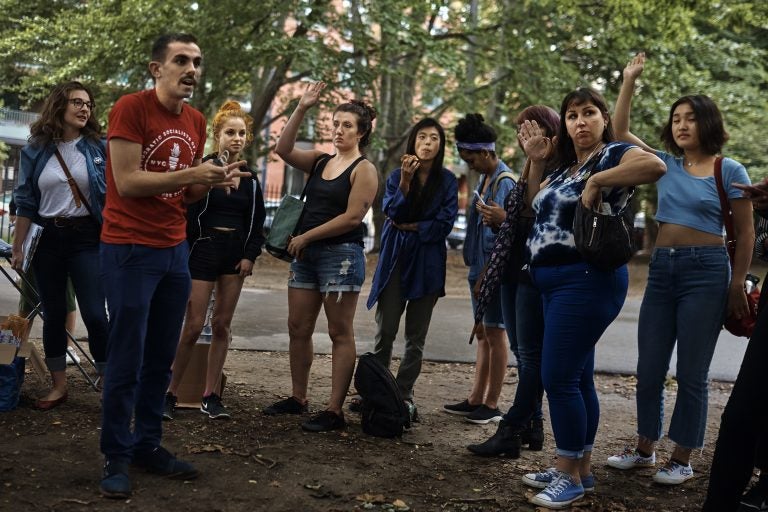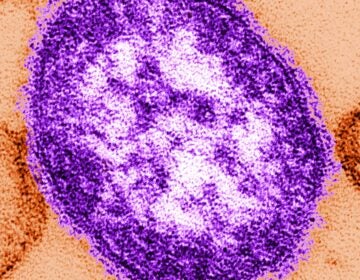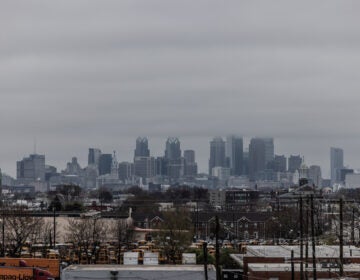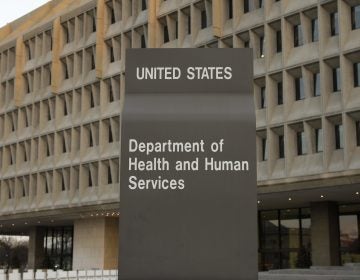At Philly health and re-entry conference, activists tout benefits of decriminalizing sex work
Poor health care and criminalization of sex workers feed into each other to create a cycle, says an organizer with Project SAFE Philadelphia.

An organizer for the Democratic Socialists of America, second from left in red shirt, coaches sex workers and allies before they canvass for Julia Salazar, who is running for a seat in the New York State Senate. Salazar supports decriminalizing sex work and repealing laws that target people in the sex industry. (AP Photo/Andres Kudacki)
Lori has spent the last 30 years of her life earning her living as a sex worker.
She was forced into it by a drug dealer at the age of 15.
During that time, Lori – who WHYY agreed to identify using only her first name to protect her privacy – contracted HIV. She was prescribed antiretroviral medication and continued to do sex work, practicing safe sex. But Lori said word on the street was that having sex while HIV positive can carry felony charges.
While Pennsylvania does not have a specific law criminalizing sex while HIV positive as many states do, sex workers living with HIV face more serious charges than an HIV-negative person would for the same offense.
Lori was worried.
“Because of the risk of being arrested and being charged with a felony, I did not carry around my medication, so therefore I did not take my medication, so therefore I contracted lots of opportunistic infections,” she said. She also was sexually assaulted more than once.
Because the men did not wear condoms, they were exposed to the virus.
Lori spoke Friday to a gathering at the 16th annual Beyond the Walls: Reentry Summit and Prison Healthcare conference, hosted by the Institute of Community Justice, under the umbrella of Philadelphia FIGHT. Most of the roughly 1,300 attendees are from the Philadelphia region.
Nina Marsoopian, a former sex worker and drug user, joined Lori on the panel.
Poor health care and criminalization of sex workers feed into each other to create a cycle, said Marsoopian, now an organizer with Project SAFE Philadelphia, which offers services to sex workers throughout the city.
First, there’s stigma against sex work, which leads to laws that criminalize it. From there, good health care becomes hard to access, she said.
“When you are frequently having — especially with sex work and low-level drug offenses — short stays in incarceration, it disrupts any kind of engagement in preventive health care,” said Marsoopian. That, in turn, leads to poor health outcomes.
“When you’re one group that has all these poor health outcomes, people associate that with you being gross and dirty and bad. And that just perpetuates the stigma. So back again, in a circle,” she said.
To this end, and in light of the HIV laws that Lori spoke of, Marsoopian and her fellow presenters made the case for decriminalizing sex work as a public health strategy.
Project SAFE argues decriminalization is the most inclusive strategy to keep sex workers out of jail and healthy. As with similar efforts with marijuana, decriminalizing sex work would mean local law enforcement would agree not to prosecute those who engage in prostitution, which is illegal. Legalizing prostitution, organizers said, would create regulations — a right way and a wrong way to practice sex work — which would still allow for many people to be in violation of the law, perpetuating the cycle of incarceration for sex workers.
Philadelphia District Attorney Larry Krasner announced this year that his office would not charge sex workers for the first and second offense. Project SAFE lauds that move, but is critical of what its staff views as a highly restrictive and nearly impossible to complete diversion program for repeat offenders, called DAWN Court.
“Just about every girl I know has had their time with DAWN Court, and I don’t know of one person who has ever successfully completed that program,” said Lori.
DAWN Court has been operating in Philadelphia since 2010.
Project SAFE organizers also stressed the need for increased access to health care in light of the new SESTA/FOSTA law, passed by Congress this spring. Shifting the liability for illegal activity online away from individuals and onto websites, it was designed to reduce online sex trafficking. But communities of sex workers and others maintain it will push sex work into the shadows and onto the streets — and away from online forums where workers could vouch for and validate clients.
—
Correction: This article has been updated to reflect that activists are calling for the decriminalization of sex work.
WHYY is your source for fact-based, in-depth journalism and information. As a nonprofit organization, we rely on financial support from readers like you. Please give today.





